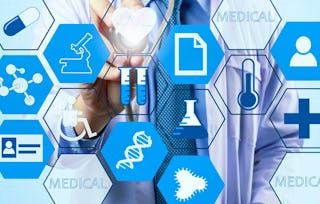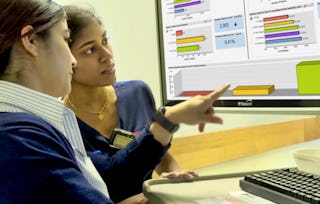This course will help lay the foundation of your healthcare data journey and provide you with knowledge and skills necessary to work in the healthcare industry as a data scientist. Healthcare is unique because it is associated with continually evolving and complex processes associated with health management and medical care. We'll learn about the many facets to consider in healthcare and determine the value and growing need for data analysts in healthcare. We'll learn about the Triple Aim and other data-enabled healthcare drivers. We'll cover different concepts and categories of healthcare data and describe how ontologies and related terms such as taxonomy and terminology organize concepts and facilitate computation. We'll discuss the common clinical representations of data in healthcare systems, including ICD-10, SNOMED, LOINC, drug vocabularies (e.g., RxNorm), and clinical data standards. We’ll discuss the various types of healthcare data and assess the complexity that occurs as you work with pulling in all the different types of data to aid in decisions. We will analyze various types and sources of healthcare data, including clinical, operational claims, and patient generated data as well as differentiate unstructured, semi-structured and structured data within health data contexts. We'll examine the inner workings of data and conceptual harmony offer some solutions to the data integration problem by defining some important concepts, methods, and applications that are important to this domain.

Healthcare Data Literacy

Healthcare Data Literacy
This course is part of Health Information Literacy for Data Analytics Specialization

Instructor: Brian Paciotti
20,771 already enrolled
Included with
(130 reviews)
Skills you'll gain
- Health Systems
- Data Quality
- Big Data
- Health Care
- Data Storage
- Healthcare Industry Knowledge
- Interoperability
- Medical Terminology
- Data Literacy
- Metadata Management
- Data Mapping
- Taxonomy
- Health Information Management
- Data Integration
- Health Informatics
- Care Coordination
- Data Dictionary
- Value-Based Care
- ICD Coding (ICD-9/ICD-10)
- Clinical Data Management
Details to know

Add to your LinkedIn profile
See how employees at top companies are mastering in-demand skills

Build your subject-matter expertise
- Learn new concepts from industry experts
- Gain a foundational understanding of a subject or tool
- Develop job-relevant skills with hands-on projects
- Earn a shareable career certificate

There are 4 modules in this course
In this module, you will be able to identify how biological and social systems are features of human well-being and health. You'll be able to describe important organizations in the US healthcare system and be able to discuss specific examples that document high cost and possible waste in the US healthcare system. You'll be able to identify and discuss the knowing-doing gap and be able to describe evidence-based efforts to transform fragmented care processes into coordinated patient-centered activities.
What's included
7 videos1 reading1 assignment3 discussion prompts
In this module, you will be able to compare forms of communication and describe why people us ontologies to describe the world. You'll be able to describe the evolution of standardized railroads in the US and recognize why the evolution of railroad tracks also applies to medical terminologies. You'll be able to analyze a dataset with disease codes and also be able to select which codes refer to specific diseases. You'll be able to match different terminologies with different descriptive domains as well as be able to contrast the different ways of organizing information into hierarchies or other categories.
What's included
6 videos1 assignment4 discussion prompts
In this module, you will be able to identify different types of medical processes and be able to explain why specific data formats emerged from these varied processes. You'll be able to list numerous data types that are found within EHRs and link specific clinical processes that created these outputs. You'll be able to trace why various types of administrative data are collected and describe the value of this data for analytics. You'll be able to identify the common ways that gene sequences are stored in computer readable files and be able to describe how big data formats are different than common relational database technologies that require a lot of data modeling and planning.
What's included
6 videos1 assignment2 discussion prompts
In this module, you will be able to tell leaders and coworkers why they should invest time in creating data dictionaries and other meta-data. You'll be able to describe why one burn registry had data fragmentation issues, and how a variety of standardization and centralization processes helped to achieve data harmony. You'll be able to answer why it is necessary to integrate data, even though the data is coming from disparate sources. You'll be able to perform data mapping as well as communicate the technical terms used to describe and perform record linkages.
What's included
7 videos1 reading1 assignment1 peer review2 discussion prompts
Earn a career certificate
Add this credential to your LinkedIn profile, resume, or CV. Share it on social media and in your performance review.
Instructor

Offered by
Explore more from Health Informatics
 Status: Free Trial
Status: Free TrialUniversity of California, Davis
 Status: Free Trial
Status: Free TrialUniversity of California, Davis
 Status: Free Trial
Status: Free Trial Status: Preview
Status: PreviewThe University of Sydney
Why people choose Coursera for their career

Felipe M.

Jennifer J.

Larry W.

Chaitanya A.
Learner reviews
- 5 stars
69.23%
- 4 stars
17.69%
- 3 stars
4.61%
- 2 stars
5.38%
- 1 star
3.07%
Showing 3 of 130
Reviewed on May 18, 2020
Thank you for keeping me on my clothes in this class
Reviewed on Jun 11, 2019
This course is well loaded with information that is useful for data scientists (or intending data scientists) in healthcare. The instructor did a wonderful job.
Reviewed on Mar 19, 2019
Overall I liked the course. I am giving 4 star due to issue with lack of forum responses. Did not look any TA was assigned to the program.

Open new doors with Coursera Plus
Unlimited access to 10,000+ world-class courses, hands-on projects, and job-ready certificate programs - all included in your subscription
Advance your career with an online degree
Earn a degree from world-class universities - 100% online
Join over 3,400 global companies that choose Coursera for Business
Upskill your employees to excel in the digital economy
Frequently asked questions
To access the course materials, assignments and to earn a Certificate, you will need to purchase the Certificate experience when you enroll in a course. You can try a Free Trial instead, or apply for Financial Aid. The course may offer 'Full Course, No Certificate' instead. This option lets you see all course materials, submit required assessments, and get a final grade. This also means that you will not be able to purchase a Certificate experience.
When you enroll in the course, you get access to all of the courses in the Specialization, and you earn a certificate when you complete the work. Your electronic Certificate will be added to your Accomplishments page - from there, you can print your Certificate or add it to your LinkedIn profile.
Yes. In select learning programs, you can apply for financial aid or a scholarship if you can’t afford the enrollment fee. If fin aid or scholarship is available for your learning program selection, you’ll find a link to apply on the description page.
More questions
Financial aid available,
¹ Some assignments in this course are AI-graded. For these assignments, your data will be used in accordance with Coursera's Privacy Notice.

